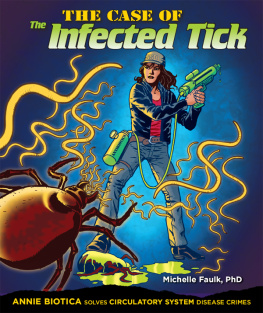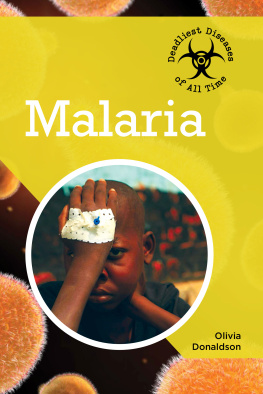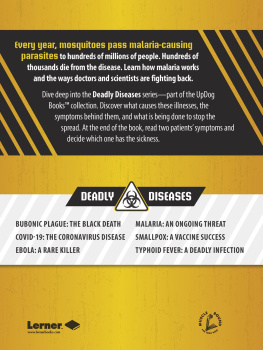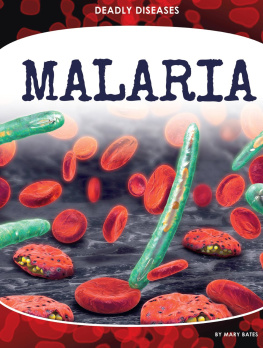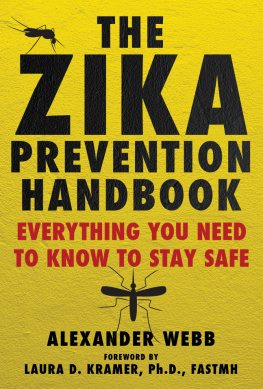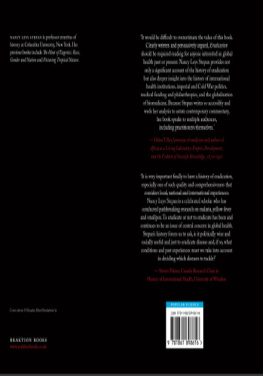CHAPTER 1
SURVIVING MALARIA
In October 2015 world-class sprinter Anyika Onuora huddled under the covers in her apartment in England. Her body shook with chills. Minutes later she felt hot. She was drenched in sweat. She knew something was very wrong.
Onuoras phone rang. It was her doctor. He had test results on the samples she had given the day before. He told her the test results. He found that there was a problem with her kidneys. He told her to see a doctor in London who could and treat her.
Onuora could not find anyone to drive her to the hospital. So she drove herself. She collapsed when she reached the hospitals reception desk. Her head swam with dizziness. She was afraid she was going to die.
Doctors ordered tests and scans. Finally, they reached a diagnosis: malaria.
Sprinter Anyika Onuora was training for the 2016 Olympic Games before she got malaria.
MALARIAS EFFECTS
Certain types of mosquitoes carry the malaria . It infects a mosquito. A mosquito then bites people and drinks their blood. This passes the parasite on to humans.
Certain types of mosquitoes pass along malaria when they bite people.
Onuora had recently visited her fathers home village in Nigeria. While there she had taken medication to prevent malaria. But she still got the disease.
There are four different types of malaria parasites. They cause different . Some parasites are deadlier than others. Onuora had been infected with the most life-threatening malaria parasite. It can cause kidneys or other organs to fail. Onuora needed to be treated right away.
In the hospital Onuoras body temperature climbed. A nurse packed bags of ice around her. The ice helped cool Onuora.
Doctors gave Onuora medicine through an IV bag. The medicine dripped from the bag into her veins. Doctors told her she would have died if she had waited any longer to seek treatment.
Malaria is most common in tropical nations, such as Nigeria.
Onuora focused on getting healthy again so she could compete in the 2016 Summer Olympic Games. She had been training for this event for years. Onuora was one of Great Britains best sprinters. She had been favored to win a medal. Now she was too weak to walk.
OLYMPIC DREAMS
Onuora gradually began to feel stronger as the medicine healed her. She did walking drills to strengthen her muscles. She took laps around the hospital hallways with her IV pole.
Onuora finally went home from the hospital in late October. She jogged a few steps. She began to feel well again. She gradually increased her distance and speed. By the next summer, she was chosen to be on a relay team in the 2016 Summer Olympics. Her team won a bronze medal. Onuora cried as she clutched her medal. She had fought hard to earn it.
Onuora used her Olympic fame to raise awareness about malaria. It [malaria] can happen to anyoneand be overcome, she said in an interview in 2017. I did it. And it really feels like a fantastic achievement.
Anyika Onuora (right) stands with her relay team after winning a bronze medal at the 2016 Summer Olympics.
CHAPTER 2
MALARIAS EARLY HISTORY
Malaria is one of the oldest known human diseases. caused many deaths across the ancient world.
Today people can explore Rome and learn how malaria killed many people in the ancient city.
About 2,000 years ago, Chinese people used herbal medicines to treat malaria symptoms, such as fever. Some treatments worked better than others. One treatment that helped used a plant called sweet wormwood. These medicines remained mostly unknown outside of China. They would later be lost to history for centuries.
FAST FACT
Some very early malaria treatments did not work at all. In about AD 200 one Roman doctor suggested wearing a cats skin tied with green emeralds and yellow coral.
MALARIA AND THE ROMAN EMPIRE
The Roman Empire was one of the largest empires in history. It collapsed in AD 476. This was partially because of failed crops and foreign invaders. Today scientists believe that malaria also played a key role. In 2016 researchers examined bones from three Roman graves. They found evidence of the parasite that causes malaria. They believe that the disease spread from Africa to Italy as the Roman Empire expanded. An epidemic may have killed large numbers of Romans. Their deaths probably contributed to the fall of the Roman Empire.
QUININE
Europeans and the African people they enslaved settled in North and South America in the 1500s. Some of these settlers had been infected with malaria. Mosquitoes quickly began to spread the disease to other people.
In the 1600s Native Americans in Peru discovered a treatment for malaria. They ground the bark of a tree called cinchona into a powder. They dissolved it in wine and drank it. Settlers took this knowledge back to Europe.
In the 1820s two European scientists found the malaria-fighting chemical in cinchona bark. They used it to make a drug called quinine. They soon discovered that quinine could be used both to treat and prevent malaria.
Many researchers believe that quinine helped European armies conquer tropical areas in Asia and Africa. Native people in these regions did not have these treatments. They were more likely than the European settlers to get malaria and die from the disease.
Today people still make quinine from cinchona bark to treat malaria.
FAST FACT
Quinine tastes bitter. It was often made into a powder and mixed into other substances to make it easier to drink. Tonic water, which contains quinine, is still sold today.
CHAPTER 3
FINDING A CAUSE
The cause of malaria remained a mystery for thousands of years. People living in the Middle Eastern city of Babylon between 2300 BC and AD 1000 blamed malaria on an angry god. Other ancient cultures had different ideas. In about 600 BC people in India thought insect bites caused malaria. Ancient Romans believed foul-smelling air from a swamp or marsh caused malaria. They called this bad air miasma.
SCIENTIFIC DISCOVERIES
The malaria. Mosquitoes bred in hot swamps or coastal areas where malaria was most common.
Doctors began to perform on patients who had died of malaria. They discovered black specks in the patients blood. The patients organs had turned black. The doctors realized that malaria moved through a persons bloodstream.



